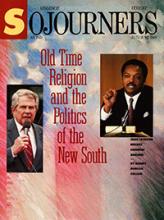When the Sojourners editorial staff sat down last fall to map out our coverage of the 1988 presidential campaign, it was clear that the old theme of "religion and politics" would again be part of the story. For the '88 season, this truth was made even more evident by the presence of two ordained ministers among the field of candidates.
The importance of the two preachers was magnified by the importance that the "Super Tuesday" primaries in March placed on the South. The South is traditionally the most religious section of the country. It is also the native land of both preacher-candidates and their strongest natural base. So we decided to focus our in-house coverage of the primaries on Jesse Jackson and Pat Robertson in the South.
In the intervening months, we think those choices have borne the test of time, even as the story has changed. For Jackson, victories in the South proved to be the springboard to broader acceptance in the rest of the country. On Super Tuesday he became a serious contender. In Michigan the prospect of his nomination became thinkable.
The frontiers of Jackson's "common ground" continue to expand. By now it is clear that we've witnessed at least the birth of an important new political personality at the national level, and perhaps the germination of a new multiracial force in American politics united around a common appeal for economic justice.
For Pat Robertson, the South proved to be the burial ground of his '88 candidacy. No force at Robertson's disposal could heal the self-inflicted wounds of his repeated misstatements about nuclear missiles in Cuba, much less overcome the mystical power of George Bush's incumbency.
Read the Full Article

